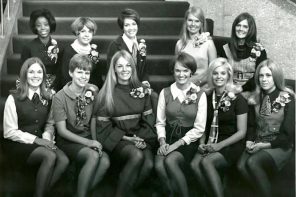In response to the Southern Poverty Law Center’s designation of 13 religious right organizations as “hate groups” because of their anti-gay rhetoric and advocacy, the Family Research Council just launched a campaign to “stand in solidarity” with those groups that received the “hate group” label (and others the SPLC labeled anti-gay) and in defense of what they call “Judeo-Christian values.”
The campaign invites signatories to a petition that reads, in part:
We, the undersigned, stand in solidarity with Family Research Council, American Family Association, Concerned Women of America, National Organization for Marriage, Liberty Counsel and other pro-family organizations that are working to protect and promote natural marriage and family. We support the vigorous but responsible exercise of the First Amendment rights of free speech and religious liberty that are the birthright of all Americans.
By joining together in “solidarity” — signatories include usual suspects Republican Reps. John Boehner, Eric Cantor, Mike Pence, and Michele Bachmann; Republican Sens. Jim DeMint, James Inhofe, and David Vitter; and probable presidential hopefuls Mike Huckabee, Tim Pawlenty, and Rick Santorum — these groups and individuals are standing together as demonizers of homosexuality and, in some cases, supporters of criminalizing it.
The American Family Association, which received the hate group designation, and its representatives have publicly supported outlawing homosexuality. Last month Tony Perkins, president of the Family Research Council, which also was labeled a “hate group,” squirmed when questioned by MSNBC’s Chris Matthews about FRC’s Peter Sprigg’s support for outlawing homosexuality during a previous appearance on Hardball. In that appearance, Sprigg responded affirmatively to Matthews’ question about whether we should “outlaw gay behavior.” The SPLC’s Mark Potok said that alone would have been enough for the SPLC to add FRC to its “hate group” list. Perkins, though, denied the group would be working to “re-criminalize homosexual behavior.” He then portrayed the FRC’s work as combatting the “attempt to. . . enshrine homosexual behavior as some protected class.”
Potok emphasized that the SPLC’s decision to place a group on the list is not about criminality or violence, but is based on whether the groups in question “demonize other groups with falsehoods” or conspiracy theories. FRC, he added, has associated gay men with pedophilia, a known falsehood.
TPM’s Evan McMorris-Santoro reported that the SPLC sees little difference between FRC and the KKK:
As [SPLC’s Heidi] Beirich told me, there is no difference between the FRC and the KKK in the eyes of the SPLC now. Still, she said that the hate group designation doesn’t mean the SPLC thinks everyone who supports the FRC “has a full understanding of what they’re up to.” Many who support the FRC may do so because of the group’s very public ties to evangelical Christianity, and Beirich stressed that the SPLC designation has nothing to do with an “attack on the churchly world.”
I asked her if a Republican choosing to address the FRC convention next year would be making the same choice as one who addressed an Aryan Nation rally.
“Yeah,” she told me. “What we’re saying is these [anti-gay] groups perpetrate hate — just like those [racist] organizations do.”
Some critics on the left charge that SPLC’s efforts “stifle free speech.” In a column about debating hate speech legislation at the Atlantic, Wendy Kaminer argued:
In part, these assertions of emotional rights are simple political power plays aimed at silencing opponents. (The Southern Poverty Law Center demonstrated the partisan uses of hate speech doctrine last week when it labeled the anti-gay Family Research Council a hate group.) In part, the subordination of one person’s freedom of speech and belief to another’s emotional well-being is an ideological stance: It reflects the morally immodest assumption that right thinking people can rightly discern and should be empowered to define the legal limits of acceptable discourse for everyone else.
Investigative journalist Ken Silverstein, then at Harper’s, was a persistent critic of SPLC, and earlier this year questioned its use of the hate group designation:
I feel that the Law Center is essentially a fraud and that it has a habit of casually labeling organizations as “hate groups.” (Which doesn’t mean that some of the groups it criticizes aren’t reprehensible.) In doing so, the SPLC shuts down debate, stifles free speech, and most of all, raises a pile of money, very little of which is used on behalf of poor people.
On the other hand, Warren Throckmorton, the evangelical psychologist who has played such a significant role in raising awareness of the evangelical world’s use of myth and falsehood to spread homophobia, had last month taken the religious right groups to task for their “mostly unfortunate and unhelpful” responses to the the SPLC. He called Kaminer’s free speech argument a “distraction” but also wrote that attempts by the evangelical groups to claim religious persecution “miss the point.” Oddly, though, Throckmorton cites Southern Baptist Theological Seminary president Albert Mohler, agreeing with his assertion that “much of what is said by Christians about homosexuals is provably false and rooted in ignorance and fear,” even though Mohler himself hardly offers an enlightened view on these issues.
Despite Throckmorton’s wish, these groups are not likely to abandon free speech claims as their chief line of defense against the SPLC. The possible squelching of their free speech is the only rational argument they have; even their religious liberty arguments fall short, as they’ve been unable to offer any actual proof that their religious liberty has been vanquished in Massachusetts or Iowa. The free speech claim is the only one for which they might get some sympathy from their detractors — but even then, as Silverstein put it, some of them are still reprehensible.
But even as the anti-gay groups are attempting to elicit sympathy from the SPLC’s decisions, they’re overplaying their hand in a big way. After all, despite the big splash that the “hate group” designation first made, it sort of fizzled and the mainstream press continues to treat the “marriage” issue as simply a dispute over the meaning of the Bible over which well-meaning people can disagree. Bringing it up again, and involving so many high-profile Republicans, invites new and probably enhanced scrutiny of the rhetoric and actions which drew the SPLC’s attention in the first place. And even if you believe the SPLC hate group designation to be a useless or even insidious endeavor, drawing a deeper look at the belief system of anti-gay zealots is a good thing. Though perhaps it wasn’t the SPLC that did that, but rather, fittingly, the religious right’s own hubris.




